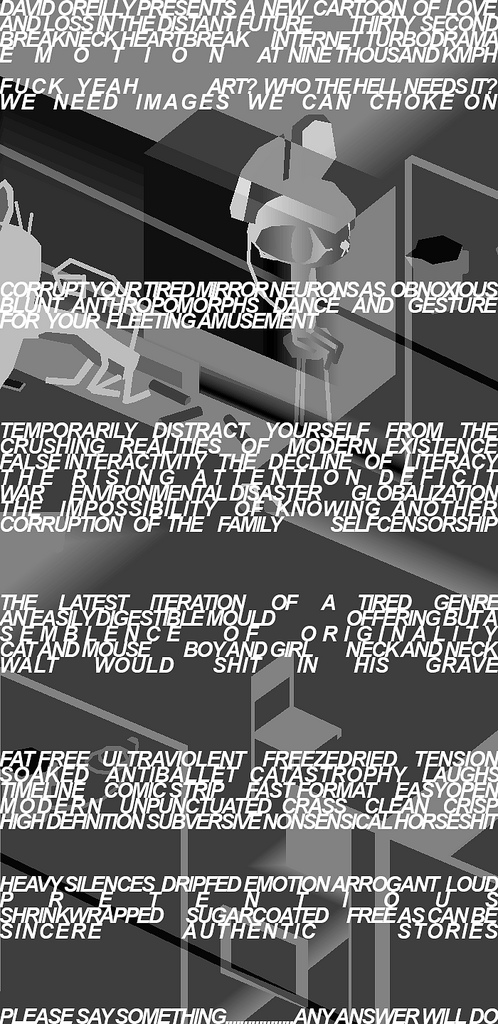Newsflash: Crappy Movie Wins an Oscar
 Yeah. I know it’s not news. I’m used to the best film not winning, but it really galls me when the WORST film nominated gets the prize. Sure, none of the nominated films were all that great, but jeesh, what was the Academy thinking?
Yeah. I know it’s not news. I’m used to the best film not winning, but it really galls me when the WORST film nominated gets the prize. Sure, none of the nominated films were all that great, but jeesh, what was the Academy thinking?
Logorama is really the best animated short film of the year?
Heck, when I saw it I couldn’t believe it was even nominated. I mean, really? This poorly crafted one-note gag filled with drooling dialogue and despicable characters (actually, I can’t even call them characters, since that would imply that some effort at characterization was apparent) was almost unwatchable. There was one high concept “we create a world constructed entirely of LOGOs! Get it?! It will be like Where’s Waldo but with trademarks. Oh how clever we are.” But they skipped the part where they found some compelling reason for this world to exist or why we would want to be there. Or develop anything resembling characters we should care about. Or any reason for us to be invested in any outcome. Or any sense of actions having any consequence at all. It’s just a random smattering of profanity, violence, and “oh look, we can use a Stop and Shop logo as a traffic light! Where’s my MacArthur grant?”
So to do my part to banish the bad juju surrounding this collective lapse of reason, I’d like to share a 10 minute animation that is a lovely antidote to the 15 minutes of screen poop that won the Oscar.
David O’Reilly‘s Please Say Something is a gorgeous example of a non-invisible, non-natural film. This is the animated short that Chris Ware would make. Actually, Chris Ware did make some animated shorts for This American Life, but I would argue that this short is more “Chris Ware”-ian than those. The American Life shorts feel like someone taking Chris Ware’s designs and rearranging the disjointed, discretized, isolated panels that make up his comic work into a flip book, which, for me, removes much of what I love about his work. This film manages to take the feeling of those disjointed, isolated panels and translate it into something that exists in time. Or maybe it’s just the isometric projections that both artists seem fond of. But I digress…
The story is wisp simple, but the manner in which it is told is surreal, lyric, and deeply moving. Its non-invisibitly is apparent in the way it plays with the medium itself, punctuating episodes with film slates and a jarring beep, creating a strange isometric space where the action occurs (kinda like The Sims), using the abrupt, twitchy walk cycles of old video games (kinda like very poorly animated Sims). Sometimes O’Reilly shows us the underlying polygon wire frames that make up his characters. An explosion is represented by the simplest of red and yellow rectangles. He plays all sorts of games with time and dreams and alternate realities (as if their regular reality wasn’t strange enough.) There is no attempt to make this film feel “natural”.
But it works beautifully. This skewed world is populated by humans and human emotions, even if they are cats and mice in a flat shaded metropolis. I care about these characters (certainly more than I cared about anything in a recent academy award winning short film). And while I was a tad disappointed by the happy-ish ending, I feel like I saw something beautiful and delicate and ineffable. A lovely little film poem.
Please watch it. Let me know what you think. Go ahead and visit the site for the hi-res version.
Please Say Something – Full Length from David OReilly on Vimeo.
This is the sort of work that excites me and makes me want to keep creating. I love the surreal, the surprise, the synthetic universe where you’re not quite sure what is going to happen next. I love the feeling of an unfamiliar territory, trying to make connections, struggling to make sense of what you’re seeing. I feel similarly when I’m listening to Stravinsky’s rhythmic games, trying to figure out where the downbeat is, listening to hear the pattern, thinking I’ve found one only to be surprised again, and finally, exhilaratingly, giving up and just letting the music happen.
Perhaps there’s something about this destruction of expectations that keeps my rational brain occupied, or perhaps causes it to give up, and allows the irrational emotional part of my brain to be unshielded and affected. Now that’s an idea that may be worth pursuing…
Ah… just noticed the end credits. O’Reilly gives himself a credit for “Aesthetic Orchestration”. Perfect.
http://motionographer.com/2009/09/24/when-graphic-plays-beyond-narrative/
maybe that will change your mind about logorama. but I agree that david’s film was the best of that year.
Thanks for the link. It definitely doesn’t change my mind. In some cases, it makes me dislike the short even more. So “all van drivers have mustaches” is the reason that Mr. Pringle is the van driver? The author contends that this is evidence that “The film is not just a haphazard amalgamation of commercial symbols though. It is a carefully instigated scenario that took on challenging artistic as well as technical decisions.”
I remain unconvinced. These guys have nothing to say.
PSS was hands down my favorite last year. IMO Logorama’s victory was predictable however given the value placed on political message in the Oscars of late.
Please Say Something made me completely change my mind about 3D animation, I had been completely put off 99% of it (probably because of the low quality soulless 3D films Hollywood has been churning out ) until I saw PSS.